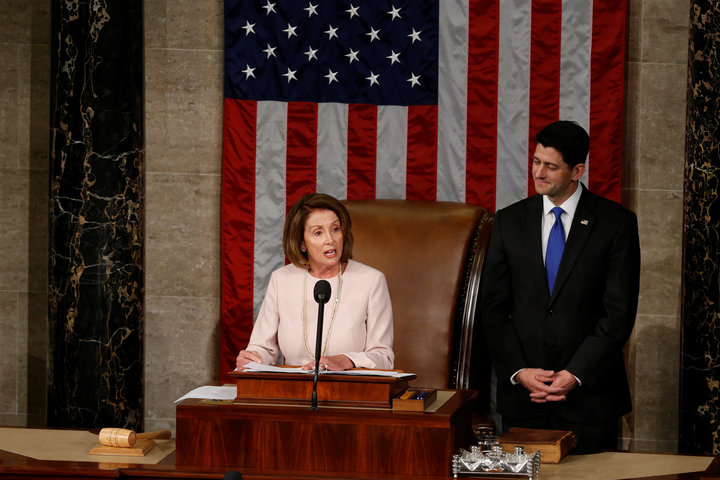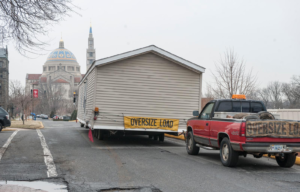Democratic Infighting Jeopardizes Pelosi’s Return as Speaker

U.S. House Speaker Paul Ryan (R-WI) listens to House Democratic Leader Nancy Pelosi (D-CA) during the opening session of the new Congress on Capitol Hill in Washington, U.S., January 3, 2017. Courtesy of REUTERS/Jonathan Ernst

By Alexander Santana
Capitol Hill is buzzing this week as members begin the process of selecting leaders for the 116th Congress.
The next Speaker of the House will be elected on January 3, 2019, the first day of the new two-year Congress. All eyes are on Democratic Leader Nancy Pelosi (D-CA). Many believe that Pelosi, the first female Speaker of the House from 2007 to 2011, will once again be elected Speaker by a majority of her Democratic colleagues. But opposition to Pelosi threatens to block her rise to the Speaker’s chair.
As of this publication, the New York Times reports that Democrats hold 229 seats and Republicans hold 198 with eight races still to be called. Both incoming and current Democratic members have stated publicly they will not support Pelosi in her bid to be Speaker. Others have asked that there be new rules changes for how the Speaker is elected. Politico is reporting that former Congressional Black Caucus Chair Rep. Marcia Fudge (D-OH) is considering challenging Pelosi. Fudge, who has signed a letter vowing to vote against Pelosi, does not believe the former Speaker has the support needed to be elected.
At the same time, Pelosi has many allies inside the House as well as outside. For the past 15 years she has raised over $700 million for her colleagues and has close relationships with incoming committee chairs.
While many await developments in the Speaker’s race, leadership elections have occurred elsewhere in the House and Senate. House Republicans elected Majority Leader Kevin McCarthy (R-CA) to serve as Republican Leader. He defeated Congressman Jim Jordan (R-OH), a founding member of the House Freedom Caucus. Majority Whip Steve Scalise (R-LA) was elected to serve as Republican Whip.
House Republicans also elected Rep. Liz Cheney (R-WY) to serve as the Conference’s chair. Cheney, the daughter of former Vice President Dick Cheney, will replace Rep. Cathy McMorris Rodgers (R-WA), who will seek a leadership position on the House Energy and Commerce Committee.
House Democrats plan to begin their leadership elections on November 28. The next House Majority Leader will most likely be current Democratic Whip Steny Hoyer (D-MD).
Both Hoyer and Pelosi have been in Congress for over 30 years and have been leaders in the Democratic Party since the early 2000’s.
Senate Republicans re-elected Majority Leader Mitch McConnell (R-KY) and promoted Conference Chairman John Thune (R-SD) to be the next Majority Whip. Senate Republicans also elected John Barrasso (R-WY) as Conference Chairman, Roy Blunt (R-MO) as Policy Committee Chairman and Todd Young (R-IN) to serve as National Republican Senatorial Committee (NRSC) Chairman.
Senate Democrats re-elected Senator Chuck Schumer (D-NY) to another term as Democratic Leader. Democratic Whip Dick Durbin (D-IL) and Assistant Democratic Leader Patty Murray (D-WA) were both re-elected to their positions for the 116th Congress.
House Committee Chairs and Ranking Members will be announced in the coming weeks.






